Our forefathers’ work and exceptional imagination transformed a pristine mountainous environment into a gorgeous royal tomb of Minh Mang – the second emperor of the Nguyen Dynasty, a monument of immense ideological and aesthetic worth.
Peacefully lying among pine-covered hills on the banks of the Perfume River, Hue’s Minh Mang Emperor Mausoleum is one of Vietnam’s most stunning imperial tombs. This royal compound, with its perfect symmetry, beautiful landscapes, and ancient architecture, encapsulates the essence of Vietnam’s Nguyen Dynasty – calm, spiritual, and regal. Minh Mang Emperors’ Tomb is a must-see for anybody interested in Hue’s royal legacy.
Contents
- 1 A Look at the History of the Minh Mang Emperor Mausoleum
- 2 Minh Mang Emperor’s Tomb: Location, Opening hours, Ticket prices?
- 3 Why You Must Visit Minh Mang Mausoleum in Hue?
- 4 How to travel to Minh Mang Royal Tomb in Hue?
- 5 Sightseeing Highlights of the Minh Mang King’s Tomb in Hue?
- 6 Suggested tourist attractions near Minh Mang Mausoleum
- 7 Travel Guide to Visit Minh Mang Emperors’ Mausoleum
- 8 Hue Day Trip from Da Nang or Hoi An
- 9 In Conclusion
A Look at the History of the Minh Mang Emperor Mausoleum

The Minh Mang King’s Mausoleum was built in commemoration of Emperor Minh Mang, the second emperor of the Nguyen Dynasty from 1820-1841. Minh Mang, known for his intellect, adherence to Confucian ideals, and national reforms, represented strong imperial power and cultural refinement.
Minh Mang Mausoleum, also known as “Hieu Mausoleum”, a name specially bestowed by Emperor Thieu Tri, exemplifies not just his filial piety toward his father, but also the Confucian philosophy of filial piety, which was highly prized in the Nguyen dynasty.
Construction on his tomb began in 1840 under his direct direction, but it was completed three years later by his successor: Emperor Thieu Tri. The end result is a huge architectural masterpiece—a resting spot that represents not just the emperor’s dignity but also the harmony between nature and the human soul, which is central to Confucian philosophy.
Minh Mang’s tomb embodies philosophical ideals, feng shui art, meticulous planning, and advanced construction skills, in addition to being the emperor’s final resting place. Today, Hue’s Minh Mang Tomb is part of the UNESCO-listed Complex of Hue Monuments.
Minh Mang Emperor’s Tomb: Location, Opening hours, Ticket prices?
Location:
Minh Mang Emperor Mausoleum Hue is located on Cam Khe Mountain, near the western bank of the Perfume River (Song Huong), approximately 12 kilometers from Hue City Center. This quiet property faces the river and is surrounded by rich pine forests and lakes, creating a wonderfully relaxing atmosphere.
Opening hours:
07:00 – 17:30 daily
Ticket prices:
Entrance fees for individual visitors are as follows:
- Adults: 150,000 VND/person
- Children aged 7 to under 12 years old: 30,000 VND/person
- Children under 6 years old: Free
Why You Must Visit Minh Mang Mausoleum in Hue?

Among Hue’s imperial tombs, Minh Mang’s is notable for its great scale, exquisite symmetry, and beautiful location. It’s a site where architecture, philosophy, and nature coexist harmoniously, representing the pinnacle of Nguyen artistry.
This mausoleum is more than simply a tourist attraction; it’s a trip through Vietnam’s royal identity. Standing beside the lotus ponds, one can almost feel the emperor’s presence lingering, serene and wise, viewing the tranquil surroundings he enjoyed in life.
Harmony between architecture and nature:
Minh Mang Mausoleum is a wonderful testament to the harmonious blend of magnificent architectural works and the surrounding natural landscape, creating an incredibly impressive overall picture.
Feng Shui layout:
The mausoleum was built based on Feng Shui principles, with mountains, lakes, and fields serving as elements of “water gathering” and a spacious “bright hall.”
Poetic beauty:
The mausoleum’s attractiveness is enhanced by the poetic setting of lush green pine trees and the magnificent and tranquil beauty of the nearby mountains.
How to travel to Minh Mang Royal Tomb in Hue?
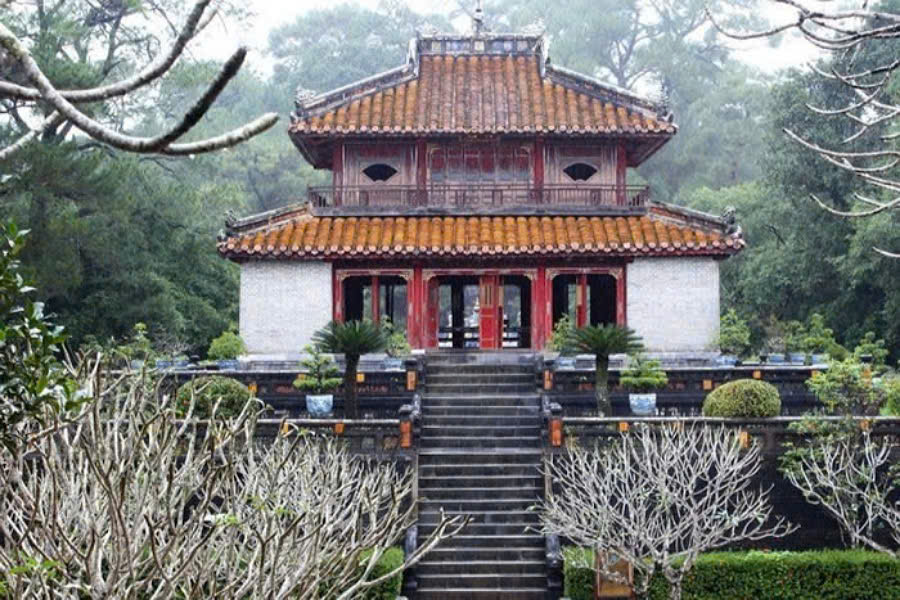
|
Vehicle |
Description |
Cost for reference |
| Taxi | Book through App or call to Operator at 1055 | 170.000 – 200.000 VND/way
(8 to 9 $U.S/way) |
| Private Car | Book through travel agent in Hue | 600.000 – 800.000 VND/day/Sedan or SUV car |
| Motorbike | Contact the hotel where you are staying or scooter rental agencies or book through App rider Grab | App rider Grab from 75.000 VND/way |
| Dragon Boat on the River | Tickets can be purchased directly at the Toa Kham dock or through travel companies. The dragon boat tour includes stops at the Imperial City, Thien Mu Pagoda, Gia Long Tomb, Khai Dinh Tomb, Hon Chen Temple, and more. The excursion lasts around ten hours. | 1.500.000 – 2.300.000 VND/per boat for depend on the number of visiting places |
Sightseeing Highlights of the Minh Mang King’s Tomb in Hue?
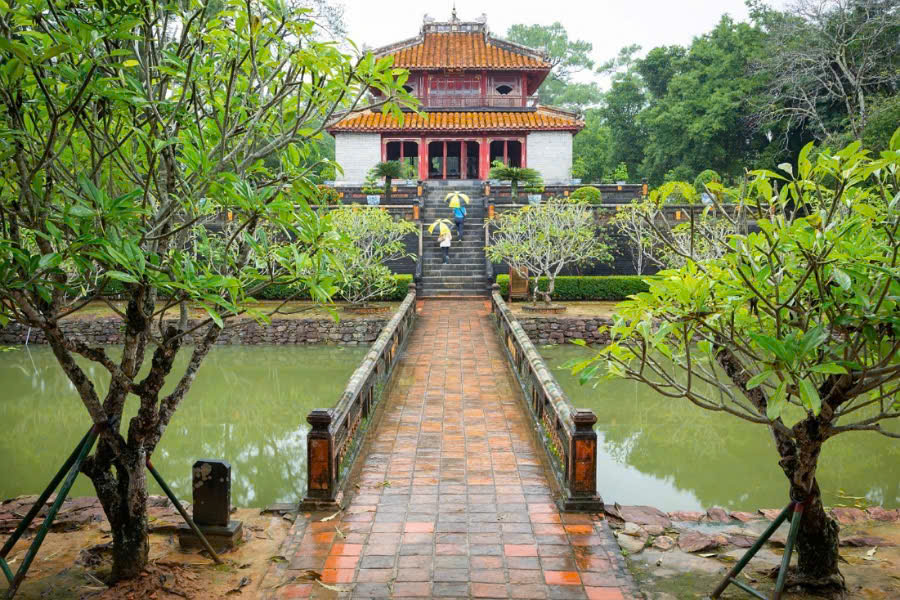
Entrance gate (Dai Hong Mon: the Great Red Gate)
When viewing from the outside, Huu Hong Mon (‘the Right Red Gate’) is on the left and Ta Hong Mon (‘the Left Red Gate’) is on the right. The main door opens only once in history, when Minh Mang’s coffin is carried inside the tomb. Now that it’s closed, guests must enter through the gate to the right.
Dai Hong Mon is the main entrance of King Minh Mang’s tomb. The gate is made of lime brick, has three walkways, and 24 thatched roofs with exquisite design featuring decorative patterns such as Carp Turns Dragon, Dragon, and Cloud.
San Chau (the Honor Courtyard)
Bai Dinh is a large courtyard paved with Bat Trang tiles that is located behind Dai Hong Mon. Both sides of the yard are lined with rows of stone sculptures depicting mandarins and generals. There are also stone whale and horse statues.
Bi Dinh (Stele Pavilion)
The Stele Pavilion rises set up by his son “Emperor Thieu Tri”, preserving Thanh Duc Than Cong stele with 2,500 Mandarin Chinese letters are carved on this 3-meter-tall block of hard stone to honor Minh Mang King. The pavillion has many steep steps, people have to climb stairs to see it. Standing on this, visitors can take some nice pictures of the Honor Courtyard and the Main Gate Dai Hong Mon.
Điện Sùng An (Sung An Temple)
After the Stele Pavilion, there is the main walk way leading you to Hien Duc gate, then leads to Sung An Palace, which is centrally located. From 2008 to 2010, supporters from the World Monuments Fund and the Vietnam National Coal and Mineral Industries Group refurbished this three-arched gate, which was erected in 1843.
In truth, Sung An Palace consists of a temple in the center and four buildings surrounding it. Before entering the temple, tourists can view Ta Tung Tu (Left House) and Huu Tung Tu (Right House), two modest shrines dedicated to officials who served under Minh Mang monarch.
The Sung An Temple is a solemn place at the tomb. Therefore, people must remove their hats, sunglasses, and covers before entering this imperial worshipping location. Inside the palace, its interior is red and elaborately ornamented, with dragons representing the emperor, some poems written by him showcasing his Confucius’s philosophies. However, taking photographs and movies is not permitted here.
Hoang Trach Mon gate
Probably among popular spot for Instagrammers. From here, you can see a bright pavilion rising from the landscape, surrounded by lovely flowers of Frangipani and pine trees. Yes, it’s an excellent backdrop and the most iconic photograph of the mausoleum you can find it here.
Dien Minh Lau (Minh Lau Pavilion)
Also known as the “Bright Pavilion, where on clear, moonlit summer nights, the King would contemplate in the Minh Lau Pavilion, It depicts the ancient people’s understanding of the cosmos and their philosophy of life; the structure is square-shaped, two-story, and has eight roofs, which represent Eastern philosophy. atop either side of the Minh Lau Pavilion, gazing back, are two beautiful pillars placed atop Binh Son and Thanh Son mountains, representing that the King had “achieved peace and merit” before entering the everlasting realm.
Tan Nguyet Lake
Visitors can see look down to view Tan Nguyet Lake from Minh Lau Pavilion, a crescent-shaped lake that embraces Buu Thanh. All of this represents the infinite universe, with the crescent-shaped lake representing the Yin element (the Moon), surrounding and safeguarding the Yang element, Buu Thanh, which represents the Sun.
The Burial Place of Emperor Minh Mang
The final resting place of Minh Mang King is located at the end of the main axis. It has two spherical walls to protect the burial location (sepulcher), which is on a low slope that resembles an upside down bowl. The exact location of the sepulcher where the emperor’s coffin was interred remains unknown. Its natural location indicates that Minh Mang King has a suitable resting site with his head (the tomb) and shoulders rest against the hills, while his hands (the two man made lakes), legs, and body remain relaxed on the lower land. He also enjoys viewing two tributaries of the Perfume River, as well as the tranquil villages and gardens in the surrounding area. Thus, the Minh Mang Mausoleum’s design is distinct, inventive, and reflects its owner’s philosophy.
Suggested tourist attractions near Minh Mang Mausoleum

Khai Dinh Mausoleum
Built by the Twelfth Emperor of the Nguyen Dynasty – Khai Dinh. Hence, Khai Dinh Mausoleum, located about 9 kilometers east of Minh Mang Mausoleum, stands noteworthy for its sumptuous architecture that blends modern European design with traditional Vietnamese art. The edifice stands out for its intricate and opulent ceramic and glass ornamentation.
Tu Duc Mausoleum
Tu Duc Mausoleum, located around 7 kilometers east of Minh Mang Mausoleum, is not flashy or majestic, but rather graceful and harmonious with nature. The mausoleum’s architecture is elegant and symbolizes the talented king’s humility and gentleness, with the whole design complementing the rich green landscape, winding walks, and beautiful reflecting pools.
Thuy Xuan Incense making Village
Thuy Xuan incense village, located approximately 8 kilometers from the Minh Mang Mausoleum, is well-known for its long-standing incense-making heritage. Visitors can enjoy the vivid fields of incense blossoms in the sun, learn about the artisan incense producing process, and snap unique images. This is an excellent site to get souvenirs with a distinct Hue flavor.
Travel Guide to Visit Minh Mang Emperors’ Mausoleum
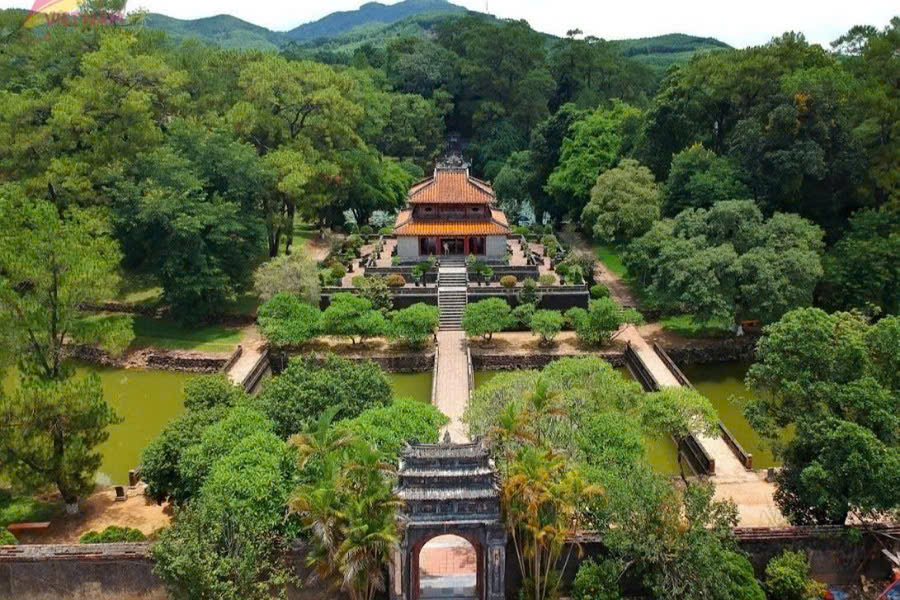
To have the most comfortable experience at Minh Mang Mausoleum, consider the following times:
Best time of year
The best time to visit is in the early morning (7:00 a.m to about 10:00 a.m) applied for all year round. At this time, the air is fresh and pleasant, and there are fewer people, allowing you to admire the architecture and enjoy the quiet of the ancient place. Take note that Hue’s dry season is March to August), it is hence typically sunny, making it ideal for outdoor sightseeing. However, it is warm, hot and humidity, you need to start off the trip early to avoid the heat.
Appropriate attire
In the dry season, visitors should wear light clothes for the warmth. To enter the Sung An Temple, tourists must wear modest clothing that covers their shoulders and extends below the knees to show respect for the sacred space.
In the wet season which usually starts from mid September to end December, wear long pant clothes and in the monsoon season that runs from mid November to end February, wear light jackets and scarfs to avoid the cold wind.
Things to bring
It is recommended that you wear comfortable shoes with soft soles for easy moving across the large grounds and numerous steps. Bring a hat, sunglasses, sunscreen, and a water bottle to protect yourself from the sun and stay hydrated from March to August. Also, remember to bring a camera or a fully charged phone to capture those special moments.
Behavior and conduct
- Avoid unpleasant behavior that may interfere with the solemnity of the historical monument.
- Do not touch the artifacts or go inside restricted places (like the Great Red Gate).
- Maintain cleanliness and don’t litter on the premises.
- Respect the calm environment and avoid making loud noise.
Hue Day Trip from Da Nang or Hoi An
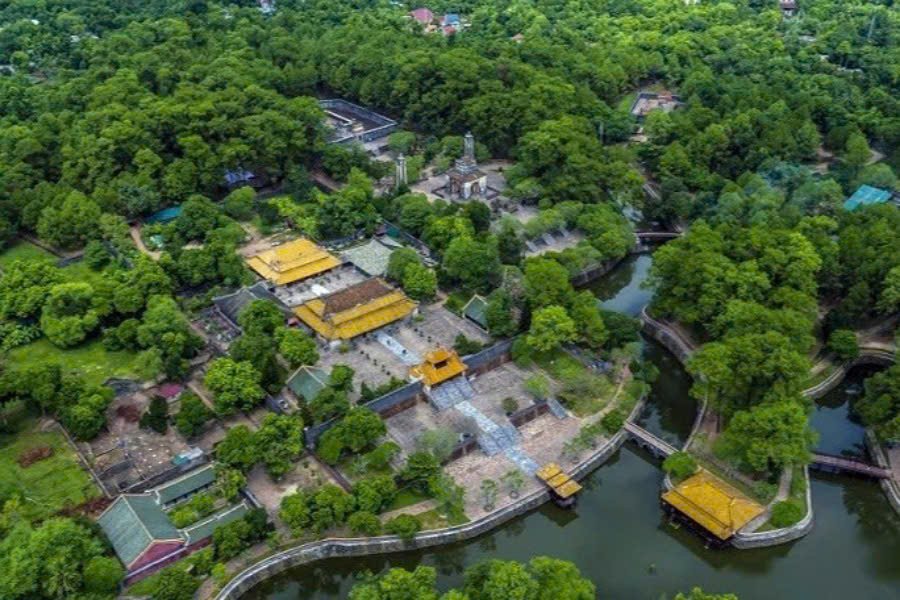
A full day trip from Da Nang or Hoi An to Hue can be organized in one day where visitors travel to Hue, Vietnam’s former capital, learning about history by seeing the Imperial City, the Forbidden Purple City, the Thien Mu Pagoda, and Minh Mang Emperor Mausoleum or an extra tomb of either Khai Dinh or Tu Duc Emperor. Thus, you will kick off the day trip in early morning with stops at Hai Van Pass and Lang Co town and Lap An Lagoon on the way to appreciate nature and take pictures of one of the best coastal roads in the world. The pass is well-known throughout the country and the world. Arrive in Hue, you then explore Hue Imperial city which served the living quarters of the Nguyen Dynasty then off to Thien Mu Pagoda for Buddist sightseeing. Lunch is supplied with Vietnamese and local cuisine in a royal-styled restaurant. Lastly, you then head your trip to King Ming Mang Tomb and Khai Dinh Tomb (optional). Finally, you then wrap up the day with transfer back through the Hai Van Tunnel heading back to your hotel. Overall, this tour is really educational to help you comprehend the locations and understand the history of the last monarchy of Vietnam. Please check more information about our Hue day trip from Da Nang or Hoi An here.
In Conclusion
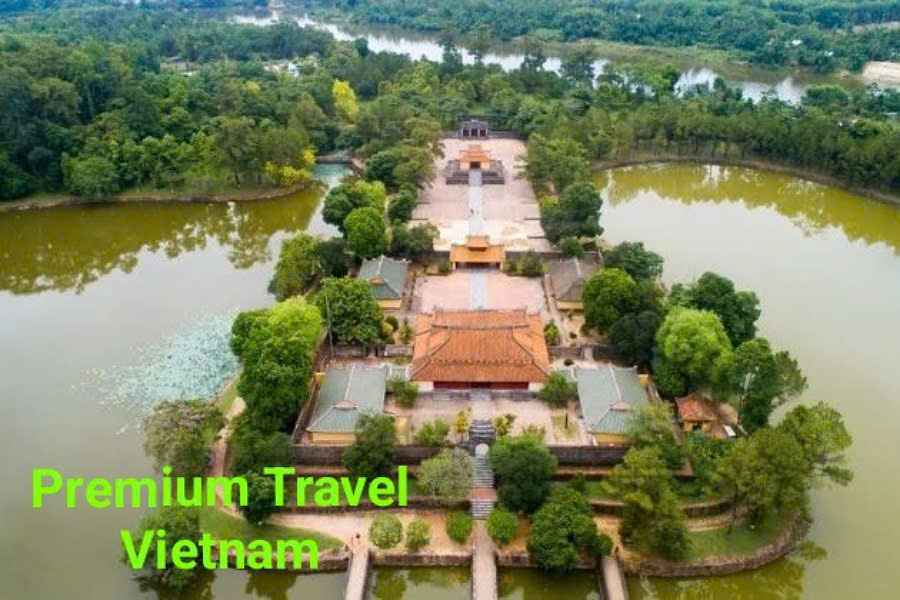
The Minh Mang Emperor Mausoleum Hue is more than just a royal monument; it is a masterpiece of balance and beauty, a perfect marriage of nature, art, and philosophy. Visiting this hallowed spot allows visitors to ponder on Vietnam’s imperial past while viewing one of the country’s most peaceful settings.
Among the many Hue Imperial Tombs, none better captures the grandeur of the Nguyen Dynasty than Minh Mang’s. Whether you come for history, architecture, or peace, this eternal monument will make an indelible impression on your tour through Central Vietnam’s cultural heartland.
